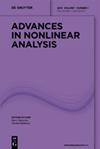On the singularly perturbation fractional Kirchhoff equations: Critical case
IF 3.7
1区 数学
Q1 MATHEMATICS
引用次数: 14
Abstract
Abstract This article deals with the following fractional Kirchhoff problem with critical exponent a + b ∫ R N ∣ ( − Δ ) s 2 u ∣ 2 d x ( − Δ ) s u = ( 1 + ε K ( x ) ) u 2 s ∗ − 1 , in R N , \left(a+b\mathop{\int }\limits_{{{\mathbb{R}}}^{N}}| {\left(-\Delta )}^{\tfrac{s}{2}}u\hspace{-0.25em}{| }^{2}{\rm{d}}x\right){\left(-\Delta )}^{s}u=\left(1+\varepsilon K\left(x)){u}^{{2}_{s}^{\ast }-1},\hspace{1.0em}\hspace{0.1em}\text{in}\hspace{0.1em}\hspace{0.33em}{{\mathbb{R}}}^{N}, where a , b > 0 a,b\gt 0 are given constants, ε \varepsilon is a small parameter, 2 s ∗ = 2 N N − 2 s {2}_{s}^{\ast }=\frac{2N}{N-2s} with 0 < s < 1 0\lt s\lt 1 and N ≥ 4 s N\ge 4s . We first prove the nondegeneracy of positive solutions when ε = 0 \varepsilon =0 . In particular, we prove that uniqueness breaks down for dimensions N > 4 s N\gt 4s , i.e., we show that there exist two nondegenerate positive solutions which seem to be completely different from the result of the fractional Schrödinger equation or the low-dimensional fractional Kirchhoff equation. Using the finite-dimensional reduction method and perturbed arguments, we also obtain the existence of positive solutions to the singular perturbation problems for ε \varepsilon small.奇异摄动分数阶Kirchhoff方程的临界情形
摘要本文讨论了临界指数为a+bŞRNŞ(−Δ)s2 uŞ2 d x(−Δleft(-\Delta)}^{s}u=\left(1+\varepsilon K\left(x)){u}^{{2}_{s} ^{\ast}-1},\ hspace{1.0em}\ hspace}0.1em}\text{in}\ tspace{0.1em}\ hspace{0.33em}{\mathbb{R}}}}^{N},其中a,b>0 a,b\gt 0是给定的常数,ε\varepsilon是一个小参数,2s*=2 N−2s{2}_{s} ^{\ast}=\ frac{2N}{N-2s},其中0<s<1 0\lt s\lt 1且N≥4 s N\ ge 4s。当ε=0 \varepsilon=0时,我们首先证明了正解的非一般性。特别地,我们证明了维数N>4sN\gt 4s的唯一性分解,即,我们证明存在两个非退化正解,这两个解似乎与分数阶薛定谔方程或低维分数阶基尔霍夫方程的结果完全不同。利用有限维约简方法和扰动变元,我们还得到了ε\varepsilon small奇异扰动问题正解的存在性。
本文章由计算机程序翻译,如有差异,请以英文原文为准。
求助全文
约1分钟内获得全文
求助全文
来源期刊

Advances in Nonlinear Analysis
MATHEMATICS, APPLIED-MATHEMATICS
CiteScore
6.00
自引率
9.50%
发文量
60
审稿时长
30 weeks
期刊介绍:
Advances in Nonlinear Analysis (ANONA) aims to publish selected research contributions devoted to nonlinear problems coming from different areas, with particular reference to those introducing new techniques capable of solving a wide range of problems. The Journal focuses on papers that address significant problems in pure and applied nonlinear analysis. ANONA seeks to present the most significant advances in this field to a wide readership, including researchers and graduate students in mathematics, physics, and engineering.
 求助内容:
求助内容: 应助结果提醒方式:
应助结果提醒方式:


